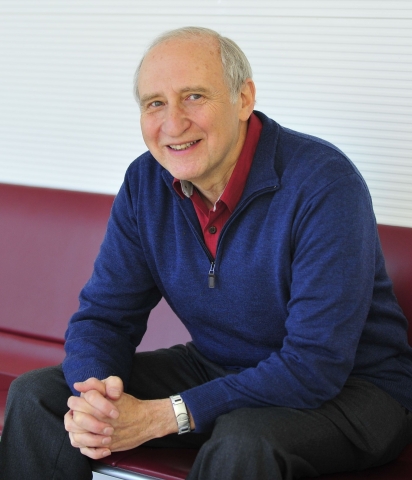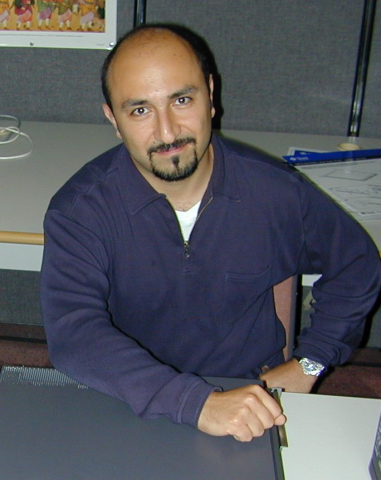Recent News & Accomplishments
2012
Professor Samir Khuller was recently named to the European Symposia on Algorithms Steering Committee. The Symposia cover research in efficient algorithms and data structures in computer science, discrete applied mathematics, operations research and mathematical programming. read more
Jeff Hollingsworth is serving as the general chair of SC12 to be held in Salt Lake City during Nov. 2012. SC12 is the premier international conference for high-performance computing (HPC), networking, storage and analysis. The conference is expecting 10,000 attendees representing more than 50 countries and more than 350 exhibitors. For more information about SC12, visit http://sc12.supercomputing.org . read more
The University of Maryland's Cyber Security Club Competition Team won first place in the college division of the Maryland Cyber Challenge and Conference (MDC3) at the CyberMaryland Conference held at the Baltimore Convention Center on October 17, 2012. Teams were challenged to a six hour Capture The Flag/King of the Hill variation which consisted of hacking into machines and protecting them from other competitors' attacks. The team won the top prize among the top 8 competitors within the college team division. The team, coached by DIT's Rob Maxwell, was comprised of the following students:... read more
Ben Shneiderman received the 2012 IEEE Visualization Career Award in recognition of his contributions to and leadership in information visualization and human computer interaction. The award was presented at the VisWeek Conference in Seattle on October 16, 2012. Shneiderman's video acceptance speech, which was shown to the 1000+ attendees ( YouTube Video ), thanks his graduate students and Dr. Catherine Plaisant for their contributions over many years. Key innovations include the dynamic queries for rapid visual exploration in multiple coordinated windows, treemaps for space-filling... read more
The Department is pleased to announce the Larry S. Davis Doctoral Dissertation Awards for 2012, for dissertations in Computer Science. The awards have been made to recent graduates: Derek Monner Title: A Neurocomputational Model of Grounded Language Comprehension and Production at the Sentence Level Advisor: Jim Reggia and Christopher Hayden Title: Clear, Correct, and Efficient Dynamic Software Updates Advisors: Jeff Foster and Mike Hicks In addition, one other thesis was given honorable mention: Nicholas Chen Title: The Use of Multiple Slate Devices to Support Active Reading Activities... read more
A paper by Amitabh Varshney and his student, Cheuk Yiu Ip, in collaboration with Joseph JaJa , has won the Best Scientific Visualization Paper Award that will be presented at the IEEE VisWeek Conference to be held during October 14-19, in Seattle. IEEE VisWeek is the largest and most prestigious visualization conference attracting close to 1000 attendees. Their paper, " Hierarchical Exploration of Volumes Using Multilevel Segmentation of the Intensity-Gradient Histograms ", presents an intelligent interface that facilitates interactive and meaningful exploration of volumes that arise in a... read more
Professor Jon Froehlich has been named the recipient of the 2012 University of Washington Distinguished Dissertation Award . Froehlich, who received a Ph.D. from UW's Computer Science and Engineering Department in 2011, received the award for his dissertation Sensing and Feedback of Everyday Activities to Promote Environmental Behaviors . It focuses on creating new types of sensors to monitor and infer everyday human activity with the goal of increasing awareness and promoting environmentally responsible behavior. read more
Professor Ashok Agrawala was recently recognized with two awards for his contributions to public safety by developing M-Urgency , the wireless campus safety application. The Wireless Foundation and CTIA-The Wireless Association with a VITA Wireless Samaritan Award at their 18th Annual Achievement Awards dinner July 23. "By recognizing the ubiquity of wireless devices on campus, Dr. Agrawala's app is an innovative use of mobile technology that is, at its core, a public safety tool. I'm pleased to present Dr. Agrawala with a VITA Wireless Samaritan Award for creating this app," said Steve... read more
ACM SIGKDD announced that Prof. Vipin Kumar is the winner of its 2012 Innovation Award . Vipin received his Ph.D. degree in Computer Science from the University of Maryland in 1982 under the guidance of Professor Laveen Kanal . Prof. Kumar is currently William Norris Professor and Head of Computer Science and Engineering Department at the University of Minnesota. ACM SIGKDD Innovation Award is the highest award for technical excellence in the field of Knowledge Discovery and Data Mining (KDD). It is conferred on one individual or one group of collaborators whose outstanding technical... read more
We are pleased to announce that S. Cenk Sahinalp has been named a University of Maryland Computer Science Department Distinguished Alumnus. Dr. Sahinalp is a Professor of Computing Science at Simon Fraser University. He received his B.Sc. in Electrical Engineering from Bilkent University and his Ph.D. in Computer Science from University of Maryland, College Park in 1997 under the supervision of Prof. Uzi Vishkin . He has been a postdoctoral fellow at Bell Labs, Murray Hill, a faculty member at University of Warwick, a research fellow at Center for BioInformatics, University of Pennsylvania... read more


